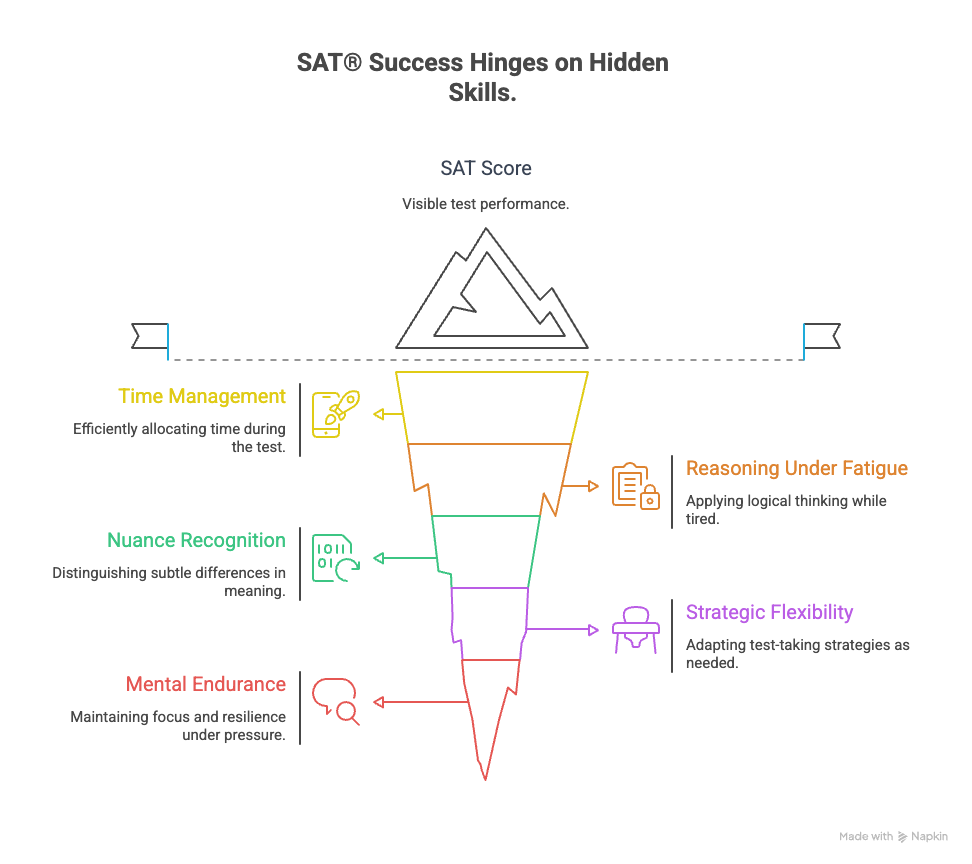You've probably told yourself:
- "I'm not a math person."
- "I just can't retain passages."
- "I wish I were smarter."
But here's the truth: The problem isn't your intelligence. It's your belief in whether improvement is possible. This is what psychologists call self-efficacy and it's the belief that you can change, learn, and get better through effort.
And it's one of the most accurate predictors of performance. Not your IQ. Not your resume. Not your potential. Your belief in your ability to grow is the real secret to successful SAT® prep.
Let's break that down and then build it up.
What Is Self-Efficacy? (And Why It's Not Self-Esteem)
Coined by psychologist Albert Bandura, self-efficacy is the belief that you can execute the actions needed to reach a goal, especially when things get hard.
It's not "I'm good at this." It's "Even if I'm not good now, I can figure it out."
Unlike self-esteem (which is broad and emotional), self-efficacy is specific and behavioral. It's the belief that your effort counts and that your actions change your trajectory. This understanding is a crucial part of effective SAT® study strategies.
Why Self-Efficacy Is the X-Factor in SAT® Prep
At Sherpalai, when we deep-dive into student performance data, SAT® Practice and those wild Perception-to-Performance comparisons, one thing keeps popping up:
- Some students think they totally bombed the test, but then they pull off amazing scores.
- Others feel like they crushed it, but totally miss subtle traps they didn't even see coming.
This isn't about being humble or big-headed. It's about self-calibration, how well you actually know your own vibe and ability in the moment. And that calibration is massively shaped by your self-efficacy, which directly impacts your SAT® and mental resilience.
Why it matters: Students with high self-efficacy are more likely to stick with tough questions, chill out better when stressed, and bounce back after making mistakes. All these skills are straight-up essential when you're under the gun during a timed test. No wonder Bandura (1997) and Zimmerman (2000) were all about it!
Sherpalai insight: When we look at what students expect to score versus what they actually score, we often see that those with strong self-efficacy have:
- Way higher completion rates.
- More consistent accuracy across different sections.
- Better bounce-back power after a module where they didn't do so hot.
Self-efficacy doesn't mean you'll always get every answer right. But it guarantees you'll stay in the game long enough to actually figure it out. That's the real flex for SAT® prep.
Here's How Low Self-Efficacy Shows Up in Your SAT® Study Strategies
You might not call it that, but you've felt it:
- You ghost practice tests. Not because you're lazy, but because you’re afraid they'll confirm your fear: that you’re not improving in your SAT® prep.
- You skim instead of review. You don’t want to see your mistakes. It feels personal. Like failure is proof of your limits.
- You wait to feel “ready” before you start. You think confidence should come first. It doesn’t. It comes from doing the thing scared, and surviving it.
Recognizing these patterns is the first step towards enhancing your SAT® and mental resilience.
Here's How to Build It Without Faking It
Self-efficacy isn't about manifesting your score. It's built through evidence, action, and accurate self-observation. Let's walk through five practical moves, short- and long-term, to strengthen your SAT® study strategies.
1. Find Proof from Your Own Past
Self-efficacy grows from what you've already overcome, but we often forget our own data.
Try this: Write down three times you figured something out you once thought was “too hard.” It doesn't have to be academic. It can be social, physical, or creative. Let that be the baseline: “I’ve figured things out before. I can do it again.” This past success is a powerful fuel for your current SAT® prep.
2. Redefine What Success Looks Like Today
If success always means “perfect,” you’ll always feel behind.
Try this: Start each study session with this line: “Today, my job is to get 5% clearer on one idea.” That’s it. Not finish a book. Not score 1600. Just 5% better. Measurable, specific, enough. This small shift in focus can dramatically improve your SAT® study strategies.
3. Practice Under Pressure (But With Safety Nets)
Sherpalai’s Endurance Test mimics high-stress conditions. But it's not just to test knowledge, it helps students confront mental stamina and recalibrate their own expectations. This is vital for building SAT® and mental resilience.
Try this: Take one section under real time pressure. Don’t aim to ace it. Aim to observe how your mind behaves under tension, then learn from it. Self-efficacy increases when you see yourself survive difficulty. This is a critical aspect of effective SAT® prep.
4. Separate Identity from Outcome
You missed 12 questions. That doesn’t make you “bad at math.” It means 12 concepts need attention for your SAT® study.
Try this: Replace “I’m bad at ___” with “I haven’t built fluency in ___ yet.” This one-word shift turns a wall into a path, empowering your SAT® prep.
5. Rehearse the Recovery, Not Just the Ideal
Students often imagine test day going perfectly. But what builds real confidence is rehearsing what happens when it doesn't. This is key for SAT® and mental resilience.
.png)





